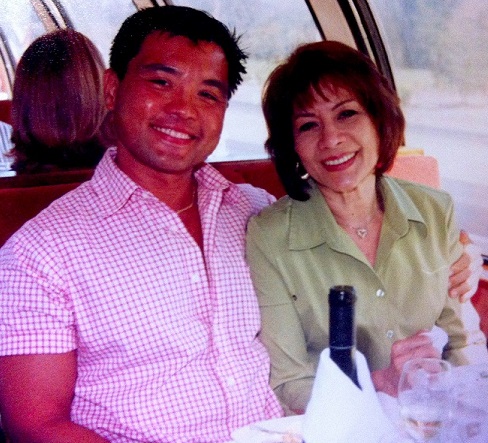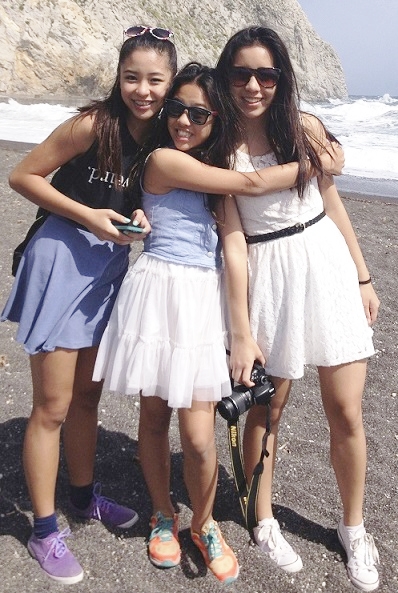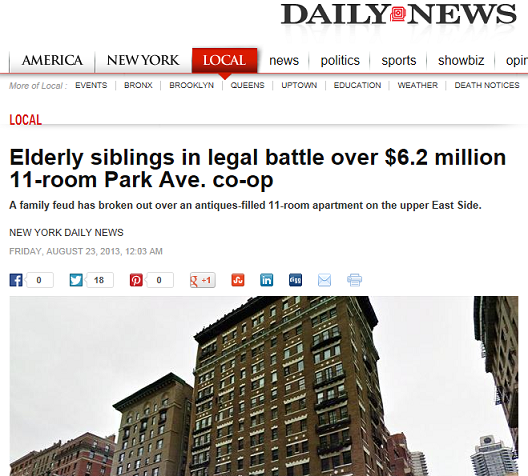Family feuds over $6.2 M Park Avenue apartment
By Cristina DC PastorWealthy siblings are fighting over a Park Avenue co-op sold in July for $6.2 million, as well as an art and antique collection worth about $1 million that is currently being auctioned off by a Manhattan gallery.
In an affidavit filed August 22, lawyer Pompeyo Realuyo, 79, is asking the Manhattan Supreme Court to issue a restraining order on: 1) the disposition of the proceeds of the sale of the 535 Park Avenue, Apartment 6A&C, which he said his sister Amelia Realuyo, 81, sold “fraudulently,” and 2) the sale of the art and antiques collection that came with the co-op.
The FilAm obtained copies of four court documents including two affidavits from Pompeyo dated August 22 and a summons & verified complaint dated August 21.
New York’s tabloids feasted on the juicy story about elderly siblings fighting over a piece of prime Park Avenue property. The Post headlined it as “Coconut fortune heir sells luxurious Park Avenue pad out from under siblings — and now she’s going for more,” while the Daily News reported, “Elderly siblings in legal battle over $6.2 million 11-room Park Ave. co-op.”
The case pits Pompeyo Realuyo against sisters Amelia and Josephine.
In his affidavit, Pompeyo detailed how the family came to own the property in 1977:
“During 1976, five members of the Realuyo family, i.e., defendants Amelia and Josephine Realuyo, one of their brothers (Gerry), and their parents (Mr. and Mrs. Realuyo), attempted to purchase the Apartment located at 535 Park Avenue (Apt. A&C). However, the co-op board objected to the purchase by all five family members, and insisted that only one individual could be named as the shareholder and proprietary lease holder. The co-op board also limited the occupancy of the apartment to the five specified family members: Mr. and Mrs. Realuyo, Amelia, Josephine and Gerry. The ‘ownership’ dilemma was solved when Amelia, Josephine and Gerry agreed that Amelia’s name would be listed on the co-op share certificate for the apartment, and that she would also be named in the proprietary lease.”
The sale was finalized in 1977.
For many years, this agreement “was honored” by the siblings who lived in the apartment: Amelia, Josephine and Gerry, according to court documents. The deceased Gertrudo (or Gerry), another brother, is identified in court papers as an interior designer and a serious collector of art works and antiques that are being sold by Amelia.
“Virtually all of the furnishings for the apartment were provided by Gerry Realuyo, who, over the span of many years, had acquired an extensive collection of valuable antiques and art works. The only furnishing of any real value in the apartment that was not owned by Gerry was a Steinway grand piano, which was owned by Amelia,” said the complaint.
As detailed in Pompeyo’s complaint, “Gerry made it clear to his two sisters, Amelia and Josephine, that he wished to leave his valuable art and antique collection located in the apartment to the plaintiff, Roa Realuyo Family Foundation.”
Continued the complaint: “Despite his clear instructions, Amelia consigned the collection to defendant Doyle for sale and/or auction, despite the fact that she was not the bona fide owner of the collection.”
Another sibling Augusto, also deceased, was a Bataan Death March survivor and was not mentioned in court papers at all. However, reference to Augusto was made in the NY Post where Pompeyo said the Roa Realuyo Family Foundation that he represents is named after brother Augusto Roa Realuyo, “who died in 2003 at age 82 and had completed two tours in WWII and survived both the death march and a brutal Japanese prison camp.”
Pompeyo further said Amelia sold the apartment at a “lowball price” of $6.25 million, substantially below the market value.
“Defendant Amelia Realuyo…acted in bad faith by executing the sales contracts and other documentation relating to the transfer of an ownership interest in the apartment, resulting in the fraudulent and unauthorized transfer of the apartment and the co-op shares,” he said.
Also named co-defendants in the suit are Felicidad Tortosa, the long-time partner of Amelia; and William Doyle Galleries, to whom the arts and antiques collection has been consigned. JP Morgan Chase Bank and Citibank N.A., where proceeds from the sale of the apartment are said to be deposited, are also named in court papers as defendants.
The affidavit warned that proceeds from the sale may be transferred since Amelia and her partner Tortosa have second homes in Spain.
When reached by The FilAm, Pompeyo declined to comment for this article.













